hankyoreh
Links to other country sites 다른 나라 사이트 링크
With “Cyber Hell,” director hopes to tell viewers: “You are not a spectator”
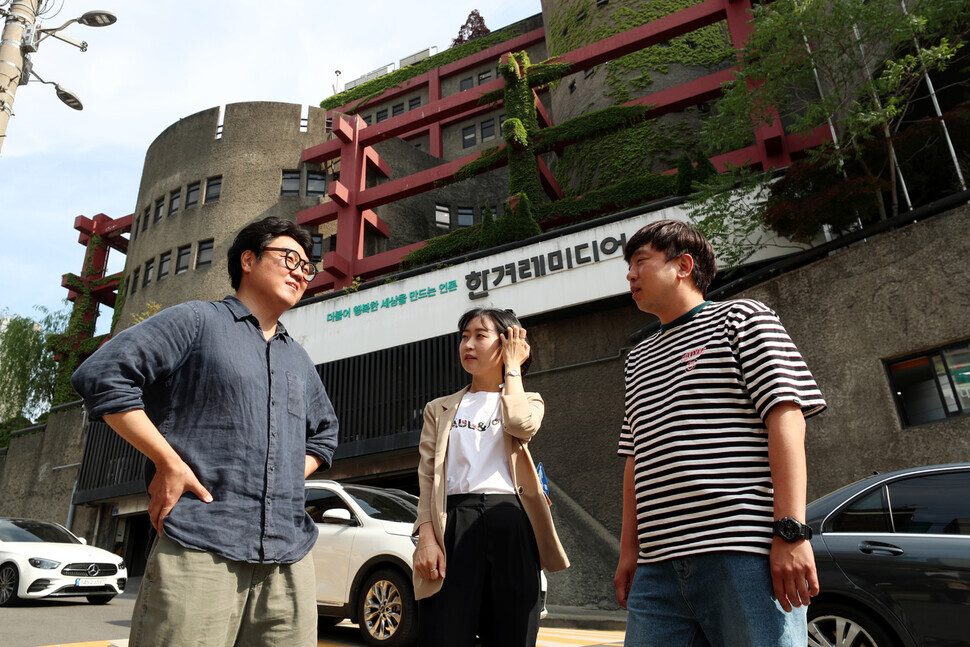
The sex abuse blackmail ring known as the “Nth Room” case became widely known in Korea via the Hankyoreh’s in-depth reporting throughout November of 2019.
Following reporter Kim Wan’s coverage of the case for the Hankyoreh, film companies wanting to recreate the case into a dramatic movie continuously contacted him, asking to consult him. However, Kim declined such requests, explaining that it would be inappropriate to render the case into a drama, as suspects were still on trial, and as victims would not be able to endure seeing reenactments of the abuses they had suffered.
In spite of this, Kim can be seen in “Cyber Hell: Exposing an Internet Horror,” the Netflix documentary released on May 18 that deals with the Nth Room case. What had changed his mind?
The director of the documentary Choi Jin-seong had been in discussions to make a documentary for Netflix starting in early 2020. “Netflix has a true crime documentary category. I decided to make one, and weighed whether to make a film about the Hwaseong serial murders or the Nth Room case. Eventually, I suggested the Nth Room case. I thought it would be meaningful to raise awareness about and alert the world to a virtual cybercrime that’s easy to imitate but can cause long-term suffering for victims on a global platform like Netflix,” Choi said during a meeting at the Hankyoreh’s office in Seoul’s Mapo District on Tuesday.
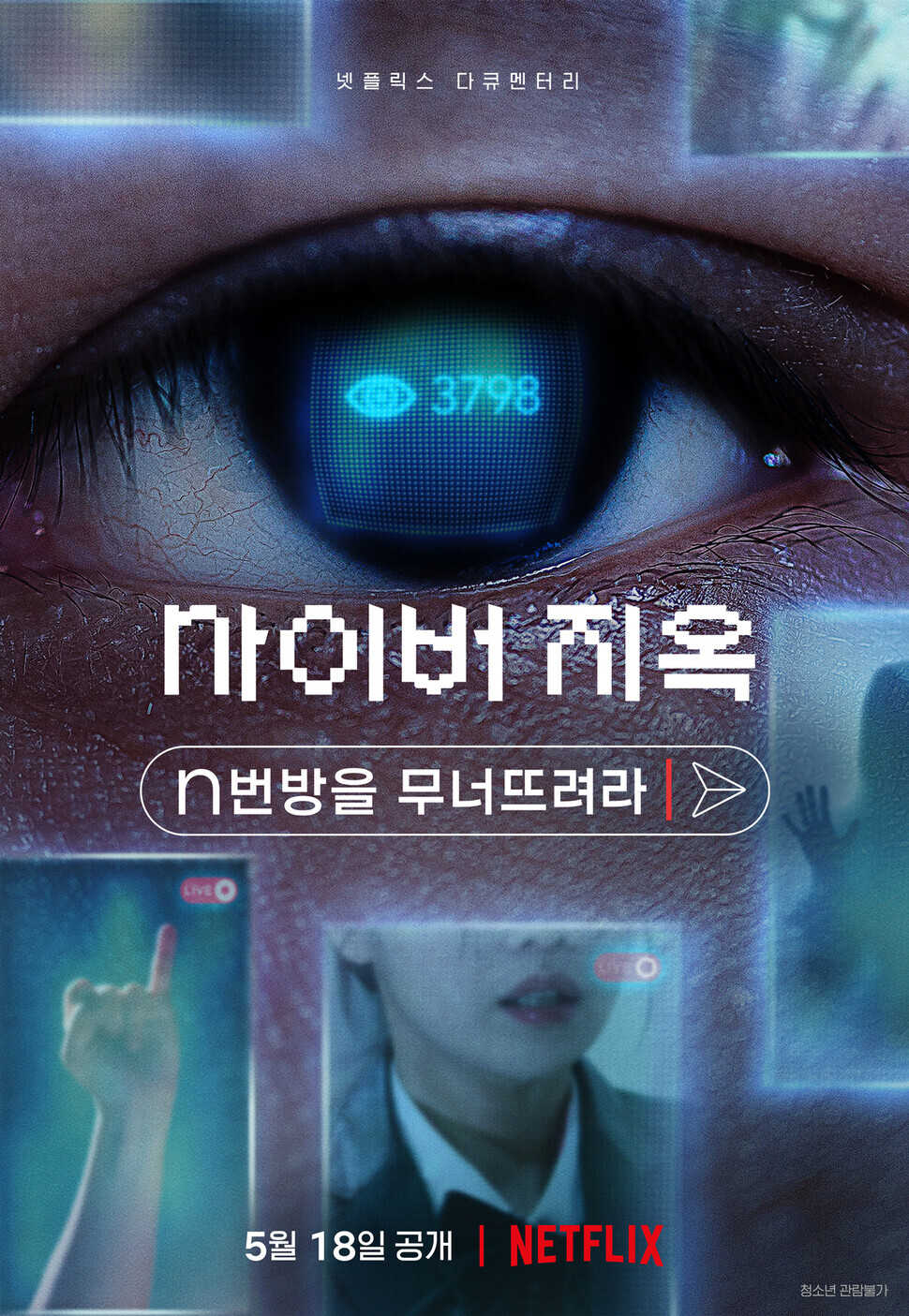
Choi asked Kim for help. As it happens, the two had known each other for 20 years, having been good friends since the time Kim worked at the Chungmuro Intermedia Playground in 2002.
“A Taiwanese news outlet was the first to contact us after our article came out, saying they had similar cases in Taiwan,” Kim said. “I was realizing that crimes like the Nth Room case were spreading globally when Kim contacted me about his project, which drew my attention because it would be released worldwide through Netflix. Even more, it would be a documentary, not a dramatization. I also knew and trusted Choi to stick to the right thing to do, politically speaking.”
Kim agreed to appear in the film and suggested that women should be included in the film’s production. Choi was of the same mind. He determined to make sure that his film would not reopen the wounds of sexual exploitation suffered by the victims and filled 70% of staff positions, including the assistant director post, with women.
“The music in the film, animations [portraying the victims] — everything was made by women, because of concerns that if men made them, they might unintentionally misrepresent,” Choi said. Pictures of the victims were used as little as possible, and when they were necessary, they were substituted by blurred reproductions of the original.
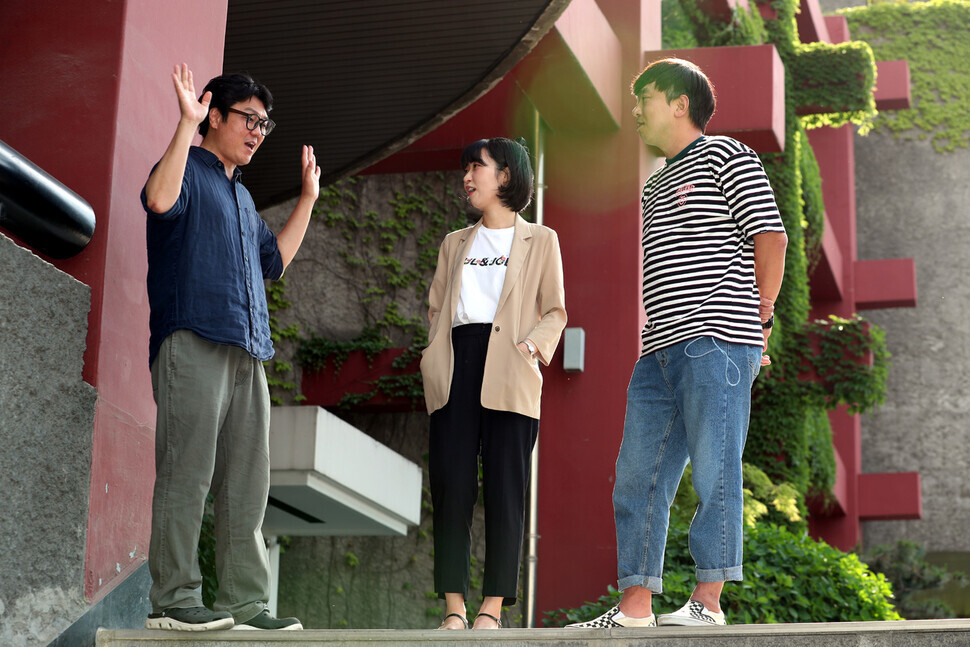
Choi has a lot of experience directing dramatic films as well as documentaries. “I believed that despite it being a documentary, the film had to be entertaining and immersive in order to be able to persuade its audience,” Choi told the Hankyoreh. “I thought that if it took the form of a cybercrime investigative thriller in which journalists and the police came together to round up criminals, the film would be appropriate in terms of its story and in terms of its ethics.”
This is why the main characters that push the story forward in the documentary are Bul (alias; current Democratic Party emergency leadership committee co-chair Park Ji-hyun) and Dan (alias), college reporters of the investigative Team Flame who initially broke the story about the Nth Room case; and Kim Wan and Oh Yeon-seo, Hankyoreh reporters who were the first to cover the story in the established press.
These characters were led to enormous sets one would expect to see at a filming site for a dramatic movie. Choi built separate sets for each of them. Kim and Oh were seated in front of desks covered with heaps of documents, a whiteboard plastered with paper and shelves overflowing with books in the background. The lighting heightened the contrast on set, giving the documentary the feel of a noir film.
“I had the idea that visuals would play a key role in making the film seem like an investigative crime thriller to the audience. I tried to portray the characters as investigators through creating sets and lighting suitable for each character,” Choi explained.

Kim and Oh calmly opened up about their experience reporting the case. What’s noteworthy is that unlike in typical interview scenes, they both looked into the camera, creating the sense that they were looking into the eyes of the audience.
On set, they were strictly by themselves. They could see neither the camera nor the staff. The prompter was the only thing in front of them. On it, they could see Choi’s face. When Choi asked them a question from within the prompter, they answered.
Oh recalled, “I talked all by myself in a space that felt like a vacuum, empty of both people and noise. At a certain point, I started letting everything out, as if I was possessed. I even teared up in certain moments, letting out these emotions I never realized I had.”
On his directorial intention, Choi said, “I used a device called Interrotron in order to make it seem like the characters were conversing with the audience eye to eye. I wanted to send the message, ‘You are not a spectator. Whether you’re a woman or a man, this is your story,’ to the viewers.”
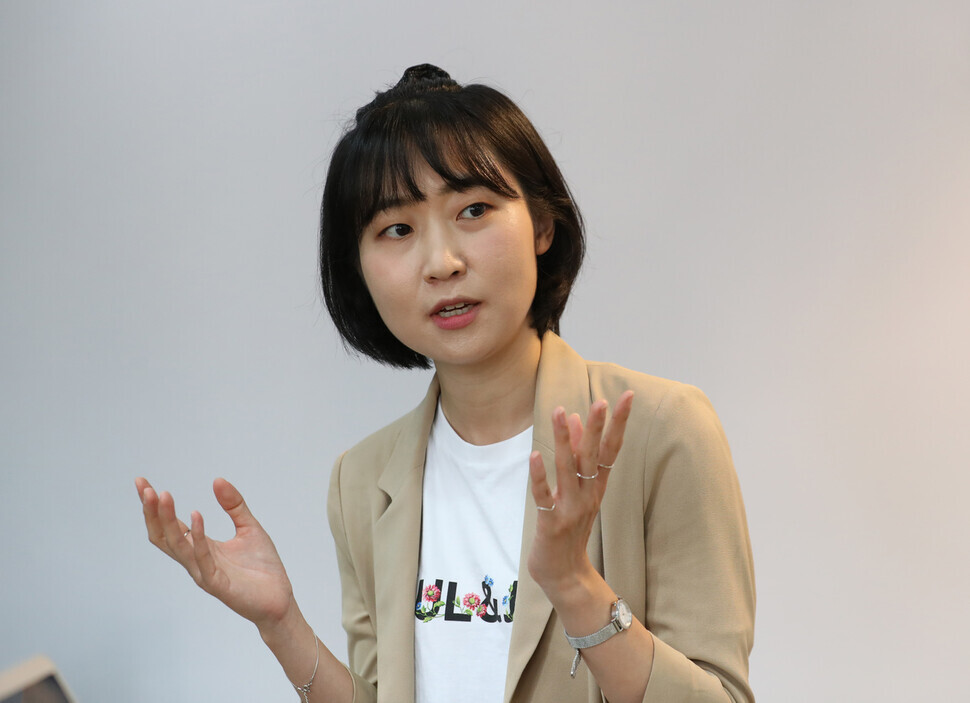
The two reporters said being part of the film allowed them to confront and heal the wounds they hadn’t realized covering the horrific case had caused.
“Watching the finished film allowed me to viscerally witness how my attitude shifted throughout my reportage,” Oh said. “I realized that at first, I just covered the case as an early-career journalist because a senior reporter told me to, but that, over time, I started to empathize with the victims and struggled with the compulsion to stay cool-headed as a journalist. Watching that transformation was somehow healing.”
Kim also said, “I didn’t find the process of reporting the case too difficult, but I really struggled when the suspect ‘Baksa’ [also known as ‘Doctor’] got caught. He was so young that I got very anxious imagining him harassing my family after finishing his short prison sentence, and thinking that every twenty-something I saw on the streets was a member of the ‘Baksa Room.’ I went to therapy. Venting about my story and feeling all these overwhelming emotions have helped bring me some peace.”
The documentary then continues on to narrating back to back the follow-up reportage by JTBC’s “Spotlight” and SBS’ “Curious Story Y,” as well as the police’s investigation process.
“Everyone from the media and the police to women’s groups and even the suspects’ lawyers cooperated,” Choi said. “After connecting the lone fights fought by those who chanced upon hell and got caught up in a storm, I came to the conclusion that invisible solidarity was what led to the culprits being arrested. In a sense, the case was solved not just by the 24 people who appear in the movie but also by the countless people behind the scenes. I think that, in itself, is the ‘drama’ as well as the most important message of the film.”
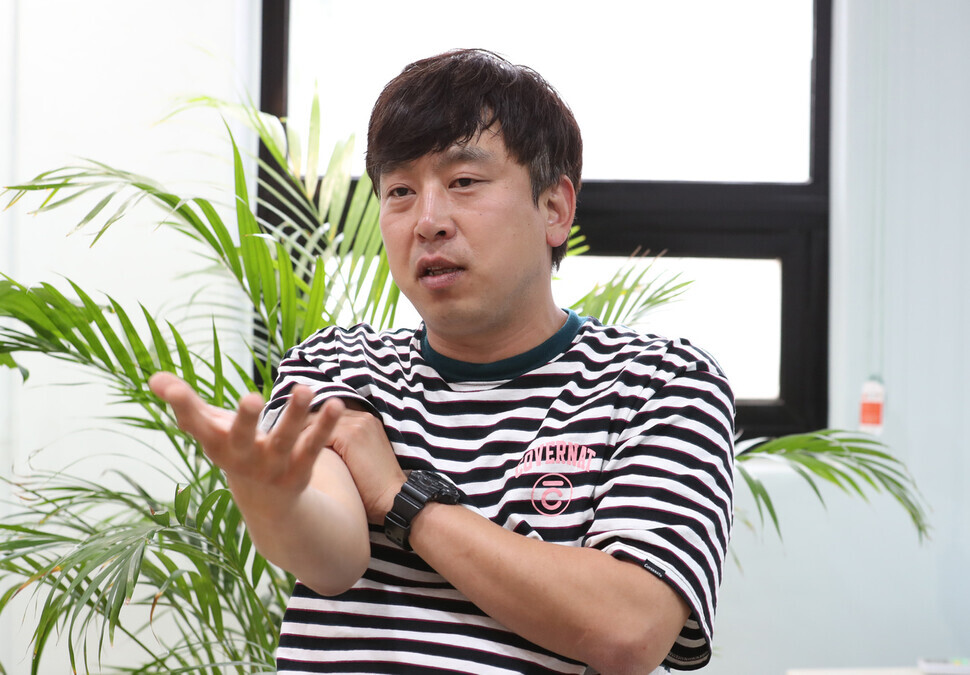
Although the main suspects have been caught, the Nth Room case is still ongoing. According to a recent Hankyoreh report, 378 “regular accomplices” of the case received, on average, a fine of 6.53 million won or a prison sentence of 13.2 months in their first trial. Among the regular accomplices, a whopping 261 (69.1%) were given suspended sentences. A defendant in his 20s who downloaded and possessed over 600 pieces of sexually explicit material involving children or teenagers was even declared not guilty.
Kim said, “When it comes to digital sex crimes, severe punishment [for those who produced and distributed sexual abuse materials] and punishment [for those who downloaded and viewed them] are both necessary, but the latter is not being done to a sufficient level.”
Oh added, “These crimes continue to take place because of demand and interest. Simply possessing sexual abuse materials should lead to punishment as severe as that leveled to producers of such material, but regulations are not there yet, which is disappointing.”
According to the global streaming content ranking website FlixPatrol, “Cyber Hell” took the No. 17 spot on the website’s global Netflix movies chart on Wednesday. The film was also listed on the website’s top 10 Netflix movies chart in nine Asian countries including South Korea, Hong Kong, Vietnam, Taiwan, and Japan. This is an unprecedented accomplishment for a documentary.
Choi said, “As a director, making cinematic achievements is important, and it’s nice to receive praise for how interesting and meaningful my work is, but I think it would be most rewarding if the danger of digital sex crimes becomes known across the world.”
“Ultimately, I want my documentary to be used as educational material. It’s a shame that teenagers can’t watch the film because of its rating, but I hope both men and women watch it when they’ve newly become adults.”
By Suh Jung-min, staff reporter
Please direct questions or comments to [english@hani.co.kr]

Editorial・opinion
![[Guest essay] Preventing Korean Peninsula from becoming front line of new cold war [Guest essay] Preventing Korean Peninsula from becoming front line of new cold war](https://flexible.img.hani.co.kr/flexible/normal/500/300/imgdb/original/2024/0507/7217150679227807.jpg) [Guest essay] Preventing Korean Peninsula from becoming front line of new cold war
[Guest essay] Preventing Korean Peninsula from becoming front line of new cold war![[Column] The state is back — but is it in business? [Column] The state is back — but is it in business?](https://flexible.img.hani.co.kr/flexible/normal/500/300/imgdb/original/2024/0506/8217149564092725.jpg) [Column] The state is back — but is it in business?
[Column] The state is back — but is it in business?- [Column] Life on our Trisolaris
- [Editorial] Penalties for airing allegations against Korea’s first lady endanger free press
- [Editorial] Yoon must halt procurement of SM-3 interceptor missiles
- [Guest essay] Maybe Korea’s rapid population decline is an opportunity, not a crisis
- [Column] Can Yoon steer diplomacy with Russia, China back on track?
- [Column] Season 2 of special prosecutor probe may be coming to Korea soon
- [Column] Park Geun-hye déjà vu in Yoon Suk-yeol
- [Editorial] New weight of N. Korea’s nuclear threats makes dialogue all the more urgent
Most viewed articles
- 1Behind-the-times gender change regulations leave trans Koreans in the lurch
- 2Family that exposed military cover-up of loved one’s death reflect on Marine’s death
- 3Yoon’s revival of civil affairs senior secretary criticized as shield against judicial scrutiny
- 4South Korean ambassador attends Putin’s inauguration as US and others boycott
- 5Marines who survived flood that killed colleague urge president to OK special counsel probe
- 6‘Weddingflation’ breaks the bank for Korean couples-to-be
- 7Hybe-Ador dispute shines light on pervasive issues behind K-pop’s tidy facade
- 8Lee Jung-jae of “Squid Game” named on A100 list of most influential Asian Pacific leaders
- 9Yoon’s broken-compass diplomacy is steering Korea into serving US, Japanese interests
- 10U.S. band that performed in N. Korea looking forward to going back